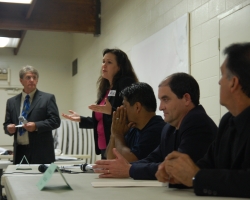Candidates in various Chula Vista political races, and groups on both sides of Proposition G, turned out Monday night for a conversation with residents. Neither Mayor Cheryl Cox, who is seeking re-election, nor Glen Googins, who is running for city attorney, made it to the event, both candidates citing scheduling conflicts.
Sponsored by the Southwest Chula Vista Civic Association, the event featured a less structured format than previous forums. Each candidate had nine minutes to speak about whatever topic they chose, and to take questions from the audience if they wished.
Candidate for Chula Vista city attorney Robert Faigin positioned himself as a problem solver.
He recounted a series of large employee severance settlements that Chula Vista has paid out in recent years, saying the city had a problem with personnel-related legal costs.
Faigin said he had gained experience with personnel law in his current job with the San Diego County Sheriff’s Department, and would bring that expertise to Chula Vista.
He also made sure to note that one of the large employee settlements he discussed, a sum of $175,921, actually went to his opponent.
Googins was given a severance package when he left the city attorney’s office in 2004 because of an “inability of the city attorney and Mr. Googins to work cohesively as a team.”
Mayoral candidate and current Councilman Steve Castaneda focused most of his remarks on Cox, not his other opponent Jorge Dominguez, drawing distinctions between himself and the incumbent. He mentioned Cox’s support for expansion of the city’s redevelopment areas into residential neighborhoods, something Castaneda has opposed.
Cox has stated previously that she supports such a proposal, at least in principle. Castaneda also reiterated his opposition to any change in the city’s mobile home park rent control ordinance. The residents of the city’s mobile home parks are involved in an ongoing dispute with owners over rent and other issues.
Dominguez targeted both of his opponents in his remarks, saying they were both part of the same under-performing administration.
City Council candidates touched on familiar issues like how to best bring jobs to the city and how to move forward with development on the city’s bayfront, but each emphasized different strategies.
Pat Aguilar expressed a vision for bringing the medical industry into the South Bay, to capitalize off of what she called Chula Vista’s unique mix of geography and existing medical industries.
Larry Breitfelder decried what he called excessive labor influence in the halls of power.
“We have a situation right now where the only call coming into City Hall that matters is the one from the San Diego (and Imperial Valley) labor council,” he said.
The business recruitment theme was continued by Jill Galvez, another Seat 2 candidate. Galvez, a former AT&T executive, said she thought her business experience would be a boon to the council, helping to recruit new industries to the city.
“We’ve never had corporate businesspeople on the council before … and no one can sell Chula Vista like I can, because I love it so much,” said Galvez.
Candidate Humberto Peraza talked about moving this city forward and addressed a number of revitalization issues, speaking bluntly about his frustration with what he characterized as City Hall’s political paralysis.
“I’m sick and tired of watching politicians do what’s in their best interest for the next two or three years,” Peraza said. He held up the city’s Third Avenue district as an example of lost opportunity, saying the area had the potential to become “our Little Italy,” a reference the trendy San Diego neighborhood resurrected by redevelopment initiatives.
Groups both supporting and opposed to Proposition G also made their pitch on Monday, discussing the merits of the proposal that would bar the city from entering into project labor agreements. Project labor agreements are a tool sometimes used by cities that require contractors using public money to ether sign on to a collective bargaining agreement or make contributions to an employee benefits account, in some cases a union controlled account. The two sides agreed on virtually nothing.
Lorena Gonzalez, representing the San Diego and Imperial Counties Labor Council and the “No on G” perspective, said the measure could put in jeopardy Chula Vista’s ability to receive state funding for projects in the city because state funded projects are governed by prevailing wage law, said Gonzalez.
William Baber, speaking on behalf of the Associated Builders and Contractors who support Prop G, said the fears of being shut out of state contracts were unfounded. He said the way the law was written means that the city would still be able to pay into such trust funds, just not those controlled by labor groups.














